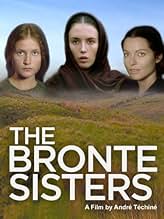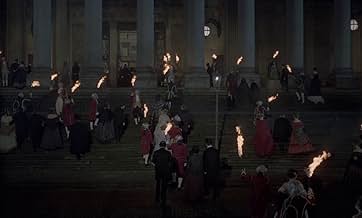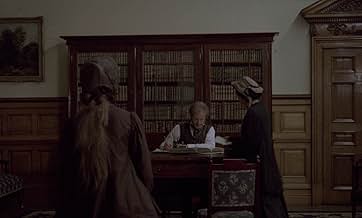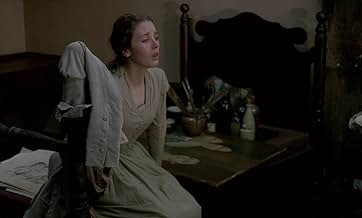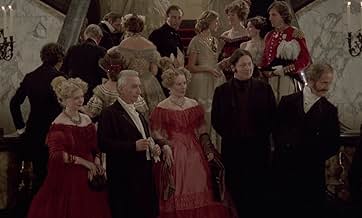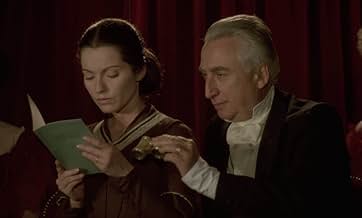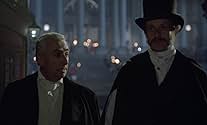Les soeurs Brontë
NOTE IMDb
6,4/10
1,3 k
MA NOTE
Ajouter une intrigue dans votre langueIn a small presbytery in Yorkshire, living under the watchful eyes of their aunt and father, a strict Anglican pastor, the Bronte sisters write their first works and quickly become literary ... Tout lireIn a small presbytery in Yorkshire, living under the watchful eyes of their aunt and father, a strict Anglican pastor, the Bronte sisters write their first works and quickly become literary sensations.In a small presbytery in Yorkshire, living under the watchful eyes of their aunt and father, a strict Anglican pastor, the Bronte sisters write their first works and quickly become literary sensations.
- Réalisation
- Scénario
- Casting principal
- Récompenses
- 3 nominations au total
Avis à la une
Premiered in Cannes and competing for Palme d'Or, Téchiné's elusive biopic about the world- famous British literature siblings met with a cold shoulder from both critics and its audience, its reputation has been reviving through time, a BluRay release is a timely step and gives a full-blown flair to this artistic project.
Starring Pisier, Adjani and Huppert, three distinctly beautiful French actresses as Charlotte, Emily and Anne Brontë respectively, and casting a then unknown Greggory as their brother Branwell, in fact, the film could be more aptly renamed as "BRANWELL BRONTË AND HIS THREE SISTERS", because his story takes a great chunk of the narrative. If one had done some background check beforehand, one would know that three of the four siblings were struck by early death, survived only by Charlotte and their father Reverend Patrick Brontë (played by the Irish veteran Magee), so death foregrounds itself as a sombre motif in the contexts, starting with their aunt Elizabeth (a wayward presence from the singular-looking Sapritch), tragic events ensue and render an elegiac sheen of pathos so astute that it permeates into the bleak surroundings and strikes spectators hard.
From the outlook of a language purist or a British loyalist, a Francophone adaptation is something of a travesty, only caters to Francophiles, which might explain its tepid reception at the first place, but Téchiné's aesthetic technique is so astonishingly eloquent, faithfully depicts the plight of intellectual women in Victorian era and knowingly nitpicks the snobbery of the aristocracy, taps into its locale's unique heath topography aided by breathtaking camera-work from DP Bruno Nuytten (Adjani's then partner), an immediate analogy off the top of my head is Andrea Arnold's outlandish offering of WUTHERING HEIGHTS (2011).
Branwell, the only male heir in the family, is a spoilt child, juggling between poetry and painting, his talent is strangled by a failed affaire du coeur with a married woman Ms. Robinson (Surgère, braves herself to a mismatch with a man much younger and immature than her), Greggory's effete physique, emotionally clingy affectation takes the challenge roundly. But it is the trio of actresses what our hearts hanker after, the two Isabelle, both in the acme of their youth, Ajani's Emily is a hard-bitten dissenter of romance and love, of fame and material trappings, even in her dying days, she draws the line at modern medicine and craves for a natural cure, she is iron-willed and portrayed as an archetype of modern feminism, which also lies the assets of WUTHERING HEIGHTS. Anne, the youngest of them, is dwarfed by her sisters in her work, seems to be a diffident, observant gal, but Huppert embodies herself with somewhat mature sensitivity, which faintly counterbalances her youthfulness.
In all fairness, it is the late Ms. Pisier, whose restrained but deeply affecting presentation of Charlotte, leaves the most memorable print on Téchiné's handsomely manufactured adaptation, meanwhile, the attendant score, an eclectic melange of classical music from Tancredi, Rossini and Schumann, runs fluently and channels the emotional upheaval of the fairly rambling plot, until a tranquil finale where some peace finally can be found under the glossiness of fame and success.
Starring Pisier, Adjani and Huppert, three distinctly beautiful French actresses as Charlotte, Emily and Anne Brontë respectively, and casting a then unknown Greggory as their brother Branwell, in fact, the film could be more aptly renamed as "BRANWELL BRONTË AND HIS THREE SISTERS", because his story takes a great chunk of the narrative. If one had done some background check beforehand, one would know that three of the four siblings were struck by early death, survived only by Charlotte and their father Reverend Patrick Brontë (played by the Irish veteran Magee), so death foregrounds itself as a sombre motif in the contexts, starting with their aunt Elizabeth (a wayward presence from the singular-looking Sapritch), tragic events ensue and render an elegiac sheen of pathos so astute that it permeates into the bleak surroundings and strikes spectators hard.
From the outlook of a language purist or a British loyalist, a Francophone adaptation is something of a travesty, only caters to Francophiles, which might explain its tepid reception at the first place, but Téchiné's aesthetic technique is so astonishingly eloquent, faithfully depicts the plight of intellectual women in Victorian era and knowingly nitpicks the snobbery of the aristocracy, taps into its locale's unique heath topography aided by breathtaking camera-work from DP Bruno Nuytten (Adjani's then partner), an immediate analogy off the top of my head is Andrea Arnold's outlandish offering of WUTHERING HEIGHTS (2011).
Branwell, the only male heir in the family, is a spoilt child, juggling between poetry and painting, his talent is strangled by a failed affaire du coeur with a married woman Ms. Robinson (Surgère, braves herself to a mismatch with a man much younger and immature than her), Greggory's effete physique, emotionally clingy affectation takes the challenge roundly. But it is the trio of actresses what our hearts hanker after, the two Isabelle, both in the acme of their youth, Ajani's Emily is a hard-bitten dissenter of romance and love, of fame and material trappings, even in her dying days, she draws the line at modern medicine and craves for a natural cure, she is iron-willed and portrayed as an archetype of modern feminism, which also lies the assets of WUTHERING HEIGHTS. Anne, the youngest of them, is dwarfed by her sisters in her work, seems to be a diffident, observant gal, but Huppert embodies herself with somewhat mature sensitivity, which faintly counterbalances her youthfulness.
In all fairness, it is the late Ms. Pisier, whose restrained but deeply affecting presentation of Charlotte, leaves the most memorable print on Téchiné's handsomely manufactured adaptation, meanwhile, the attendant score, an eclectic melange of classical music from Tancredi, Rossini and Schumann, runs fluently and channels the emotional upheaval of the fairly rambling plot, until a tranquil finale where some peace finally can be found under the glossiness of fame and success.
10MEG-40
Although I saw this film in 1979/1980 it was one of the most memorable movies of my movie viewing days. The photography was excellent and is to my mind one of the best alongside 2 or 3 other films that have appealed to my artistic senses. At the time I thought 'trust the French to make a movie about the English that is so beautifully executed'. This may sound very "highbrow" but not really. If you are into foreign language films well acted and visually appealing this is a film for you. I have been searching ever since for a chance to view it again. Top Marks 10/10
Exquisite direction, beautiful cinematography and precise performances of all the entire cast cannot prevent this film of being excessively cold. The mood tries to recreate the unexciting existences and fatalist life philosophy of the Brönte sisters, but it makes the film icy and a little dull. However, the worst of all is that you can rarely connect with such cold characters through freezing (but after all deliberate) acting. Nice effort, but failed anyway.
This is the one single wonderful biography about the Brontës!
You feel, it's French: cold, realistic and authentic... Ok, and it seems to be a little boring at the beginning; and there is no one single highlight turing the whole film. But isn't it a magnum opus? I think, exactly this kind of silence gives the film its power. Listen to the words! There is almost no dialogue without a hidden allusion to poems by the Brontë-sisters.
And Isabelle Hupperts' sensitive performance is definitely outstanding.
You feel, it's French: cold, realistic and authentic... Ok, and it seems to be a little boring at the beginning; and there is no one single highlight turing the whole film. But isn't it a magnum opus? I think, exactly this kind of silence gives the film its power. Listen to the words! There is almost no dialogue without a hidden allusion to poems by the Brontë-sisters.
And Isabelle Hupperts' sensitive performance is definitely outstanding.
A feast of perfect acting (the three actresses earn applause), inspired direction and splendid photography (which evokes the outside and the inner landscapes of the sister writers), but strictly reserved to Bronte admirers. The screenplay, built upon continuous references to the Bronte artistic work, can create a sense of icy estrangement, but who is familiar with the writings and the life of the Bronte sisters (maybe through the cult Charlotte bio by Elizabeth Gaskell) will be enchanted. It is a pity this movie remains mainly unseen. The only chance to obtain it at the moment is to get the Spanish DVD which also features the French version.
Le saviez-vous
- AnecdotesOriginal cut runs 180 minutes.
- Citations
Emily Brontë: I spit on love and all its vanity.
- Versions alternativesSimultaneously shot in two versions (French language and English language) with the same cast.
- ConnexionsVersion of The Brontës of Haworth (1973)
- Bandes originalesOuverture de Tancrède (Tancredi)
Music by Gioachino Rossini
Performed by The Academy of St. Martin-in-the-Fields (as Academy of Saint-Martin in the Fields)
Conducted by Neville Marriner
disque Philips
Meilleurs choix
Connectez-vous pour évaluer et suivre la liste de favoris afin de recevoir des recommandations personnalisées
- How long is The Brontë Sisters?Alimenté par Alexa
Détails
- Durée2 heures
- Mixage
- Rapport de forme
- 1.66 : 1
Contribuer à cette page
Suggérer une modification ou ajouter du contenu manquant

Lacune principale
By what name was Les soeurs Brontë (1979) officially released in India in English?
Répondre

